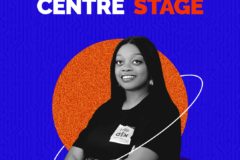Rose Odengo describes herself as big-hearted, loving, and as someone who enjoys laughing. She pours her heart into everything that she does, including storytelling, which she has been doing for close to two decades. For the past 16 years, Odengo has worked in communications and storytelling, doing everything from copywriting to journalism, and even fiction. All these three paths combined make up what she calls her “storytelling triage”, which she uses to tell the next generation of African brand stories.
Odengo is the head of communication and community at Madica, an Africa-focused pre-seed investment programme empowering underrepresented and underfunded founders in Africa. Prior to her role at Madica, she worked mainly in the non-profit sector, helping organisations like the Obama Foundation and Segal Family Foundation attain communication and marketing goals.
For Centre Stage, I had a conversation with Odengo which was lighthearted, candid, and punctuated with a lot of laughter. We discussed multiple facets of storytelling including its role in building a more formidable tech ecosystem and how startups can tell better stories.
Storytelling is a tradition
RO: Storytelling for me started when I was a child at the dinner table. Every night at dinner, my parents would tell me and my siblings stories about their childhood and what it was like growing up for them. It was a tradition in my family and fundamental to how I was raised. I learned a lot of our traditions and core life lessons via storytelling, and I grew up to love it.
I started working in Kenyan media houses as soon as I could, based on my love for telling stories, first, as a copywriter, after which I evolved into journalism because I felt like helping people sell things was not enough, but I wanted to transform society. From journalism to public relations, and it’s been a steady progression from there.
Perfection doesn’t exist for storytellers
RO: Perfection doesn’t exist for storytellers and it’s whatever we constitute it to be in our minds. To be a great storyteller, you need to understand the basics of storytelling. It goes beyond the conventional ways we’ve been taught to approach stories; having a protagonist, a plot, a dilemma etc.
When we look at storytelling as a way of documenting the truths of our society and sharing it on a global stage, then it’s just a matter of practice rather than perfection.
Writing a good story is about considering what your audience knows or doesn’t know, what you want them to know, how they will understand and interpret it and being able to piece all of these together in a way they can understand. Good stories tend to be universal and it doesn’t matter what part of the globe people are in; they should be able to connect to your story.
How personality affects storytelling
RO: I’m a Chatty Patty, but I also consider myself to be an ambivert because there are times when I like to recharge in solitude. As a storyteller, one thing that I learned over the years is the importance of listening. I haven’t always been a great listener and would always like to have the last word in conversations, but that has changed as I’ve grown as a person and as a storyteller.
I’m now an ambivert, and so I have moments where I share and talk, but also moments where I listen. Listening provides a core aspect that a lot of communication sometimes fails to do, which is context, and in order for people to be comfortable enough with opening up to you, they need to get the sense that you are willing to listen to them without judgement. The heart of listening is listening without judgement, and paying attention to your subject rather than your preconceived biases.
However, you also need some bits of extroversion because that has helped me make conversations and friends easily. This is also useful because sometimes you share stories that people can connect to and lead to the forming of bonds that are hard to break.
The role of storytelling in the African tech ecosystem
RO: People are tribal in nature, and this means that they’re going to connect with you and want the best for you when they understand you. The role of storytelling in the ecosystem is to try to build that connection in different ways.
The first way is simply eliminating the gatekeepers and making stories or sharing of information completely accessible. We see that a lot of startups are genuinely confused as to what VCs want in order to give them money. They keep thinking “What do they care about?” “What kind of questions should I be asking?”
One key thing in my role at Madica is to build a one-stop information hub where startups can access all the information they need. This also helps founders understand the psychology and understanding of how these things operate, including how to engage and talk to investors.
The second aspect is that storytelling can be a tool to engage with other players in the ecosystem. At Madica, we’re telling our stories and sharing the stories of our portfolio in the startups, and this is to get the attention of other VCs who may be interested in investing or have negative assumptions about investing in startups in Africa. We play a role in de-risking through our community building to help people see that there is more than just Nairobi, Cape Town, Cairo and Lagos.
Startups need to understand the lingua franca in order to tell stories better
RO: Across the board, a fundamental challenge of startups is always money and funding. Fundraising seems to be a struggle and it tends to be an aspect of two related things: how startups tell their stories and understanding the lingua franca of investors.
Different investors are interested in different things. While some are more interested in debt financing, others are more interested in equity, or later equity. These different investors speak different languages and your success in getting to them is determined by how well you tell your story in the lingua franca that they understand.
How startups can tell better stories
RO: The first tip I have for startups looking to tell their stories better is to ask themselves “Who exactly am I talking to?” Once you’re clear on who exactly you’re talking to, you get to understand stuff like demography and psychometrics, like what they care about and what they need. Just because we’re so drawn in by the story doesn’t mean that others will care. That’s not how humans work. Humans are all about “What’s in it for me?”, and so you need to clearly convey the benefits of whatever you’re trying to get people interested in. Think about how to use your skillset as a storyteller to figure out how to stay true to the story that you want to tell, but packaged in a way that the audience cares about.
The second thing is to identify where your audience is and the channels they use to access information that they trust. That is where you position yourself. So, it’s not just about the story that you’re telling but the tool you’ll be using to reach and engage with that audience.
One cheat code I share with founders is this: instead of paying for advertising, you can join hands and become a source of information. Radio stations and media houses are always looking to inform, educate, and entertain their audiences, but at the same time don’t have the in-house expertise in what exactly you’re selling.

The most exciting thing about storytelling at Madica
RO: This boils down to why I applied for the role in the first place. Madica is breaking bounds and cracking access wide open. One thing you find wherever there’s money is that there’s always a gatekeeper, and even when they open up the space, it’s to permit a small number of people in, who also become gatekeepers. At Madica, we’re giving founders unhindered access. You don’t need to know anyone at all to be a part of the programme which is how VCs have been operating.
My personal mission is to be able to reshape the narrative of Africa and it’s great to be able to do so at a company like Madica that believes in access regardless of region on the continent, sector you’re operating in, and especially open to marginalised groups. It’s everything that I believe in.
What it takes to build a career from telling stories
RO: Few things will improve your career as a storyteller more than research and practice. Research is fundamental to understanding where the world is going, how it is evolving and how you can stay ahead of the curve.
Storytelling needs practice, or else you become rusty regardless of how good you are. In one season of my life, I used to write flash fiction every day when I woke up before my actual day began. It’s a muscle and you must exercise it else you lose it. Good storytelling or writing is also sustained by reading. It doesn’t have to be something philosophical or profound, and could just be a kid’s book or a self-help book—as long as you’re reading because that’s an essential part of being a storyteller.
Another tip is to read widely, regardless of how boring the topic is. Storytellers are needed in every sector, and the more widely read you are, the easier it will be for you to adapt your fundamental tools from one sector to another. Don’t limit yourself to only the topics in your field; pay attention to everything else that’s happening. You might not care about these as an individual, but as a storyteller or writer, these add so much meat to your stories in ways that you might not be consciously aware of.




















